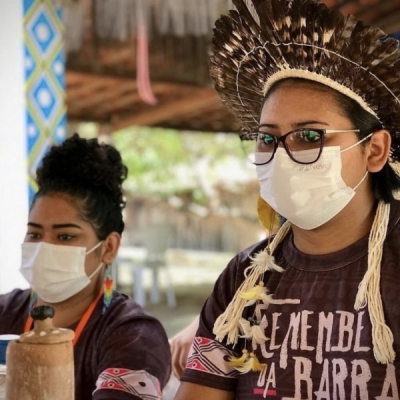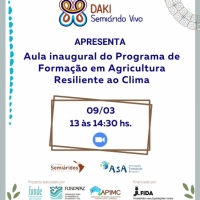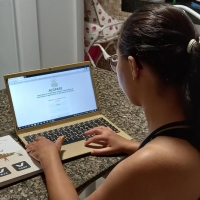News
Exchange supported by Aksaam is held during Festa do Murici and Batiputá, in Ceará

The Murici and Batiputá Festival is an intangible heritage of the Tremembé people of Barra do Mundaú, guardian of the Environmental Preservation Area of the Mundaú River Estuary, in Ceará. A natural paradise, with beaches, dunes and mangroves, considered sacred by the families who live in the four villages of the TI, which despite being demarcated, still faces conflicts, mainly due to the pressure of real estate and tourist developments, which advance with the irregular occupation of the space. , weakening natural assets and radically modifying their ways of life.
The community, even with the constant challenges, accentuated by recent setbacks that further strengthen agribusiness and the developmental model, continues to be resistance and keeps alive the tradition of celebrating to thank and honor their elders and Enchanted ones, that is, their ancestors. , which are the very nature of the place, provider of health and food.
Therefore, every year, it renews its bonds of belonging to the territory, demonstrating respect and connection with the nature of the place, visible and invisible. Always in the month of January, for more than a decade, it welcomes in its forests, trails and streams, and in many other spaces, literally “enchanted”, those who feel like adding and celebrating their food culture, immersing themselves in their ways of doing and living. and enjoying its many traditional flavors.

Cultural exchange
The last field activity proposed by the Território e Cultura Alimentar no Ceará project wove paths of approximation between the Tremembé people of Barra do Mundaú and the Tabajara indigenous youth of Sertão dos Inhamuns, in order to strengthen and give breadth to these resilient voices in the fight for appreciation of territorial identity and preservation of sociobiodiversity, as guarantees of quality of life and access to good, clean and fair food. Welcomed within the event's program, the cultural exchange action provided experiences of integration and community living and interaction with the physical space, with the fauna and flora of the estuarine environment, reducing the distances between the semi-arid region and the coast of Ceará.
To experience this opportunity, the group of young people and women mobilized by Eleniza Tabajara, indigenous leader of the Tabajara people of Sertão dos Inhamuns and local articulator of the project, with the support of Fabrícia Tabajara, director of the Carlos Levy Indigenous School, traveled about 400km to Itapipoca. The four villages that make up the territory, not yet demarcated by the federal government, are located in the municipality of Quiterianópolis, located near the border with the state of Piauí, and the guardian families still suffer from the presence of squatters, who charge for the use of their land. land itself.
Through the eyes of those who live with the reality of one of the most arid regions of the state, the highlights were the experiences at sea and in the mangrove, such as the artisanal nocturnal fishing of aratus and crabs, and the harvest of the fruits of the celebration, the murici and batiputá, which instead of being cultivated like beans, a reference in Tabajara family farming, sprout spontaneously in the restinga forests. The sunset on the gamboa and the baptism in the sacred waters were also experienced with great emotion.
In return for this immersion in the Tremembé culture, the collective representing the Tabajara youth of Sertão dos Inhamuns had the chance to share the complete way, from the slaughter of the pig, to how to prepare chorizo, a traditional sweet, heritage of their food culture, made from the animal's still warm blood. The result was greatly appreciated even by the children!
In the conversation, which took place under the pleasant shade of a mango tree, Giselle Miotto, project consultant and participant in the Slow Food Brazil Education Community, stimulated dialogue and reflection between the two beneficiary peoples to identify the potential of their communities and opportunities for strengthening economy in their territories. Valuing food and nutritional security, the educator highlighted the importance of consuming locally produced food as one of the resistance strategies in the face of globalizing processes.
Another important moment of exchanges was the circle of partners that brought together the project team, representatives of the two communities, the indigenous council and the institutions present, revealing a horizon of possibilities for continuity and expansion of network actions.
Territory and Food Culture in Ceará
The project is a realization of the Association Slow Food do Brasil (ASFB) and AKSAAM – Adapting Knowledge for Sustainable Agriculture and Market Access, a project by IFAD – International Fund for Agricultural Development in partnership with the Federal University of Viçosa (UFV), with the support of Paulo projects Freire (IFAD), São José (World Bank) and the Ivens Dias Branco School of Social Gastronomy. The actions carried out in Tremembé territory also have the support of CETRA.
Reporting: Nane Sampaio





